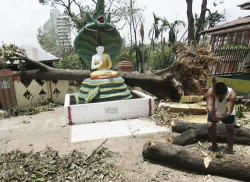By Demian McLean, Bloomberg, May 7, 2008 http://www.buddhistchannel.tv/index.php?id=51,6354,0,0,1,0 Yangon, Myanmar -- Myanmar's death toll from the weekend cyclone rose to at least 22,000 today as the nation's military rulers accepted only a trickle of the aid being offered by the rest of the world.
Yangon, Myanmar -- Myanmar's death toll from the weekend cyclone rose to at least 22,000 today as the nation's military rulers accepted only a trickle of the aid being offered by the rest of the world.
The government hasn't responded to requests for expedited visas and more open borders, said the United Nations. The UN began distributing 30 tons of locally stockpiled food as relief workers outside the country awaited entry. Acceptance of aid may be complicated by the West's embrace of dissidents who seek an end to the ruling junta.
"Let the United States come help you help the people,'' U.S. President George W. Bush said today as he signed legislation lauding opposition leader Aung San Suu Kyi, the Nobel Peace Prize winner who is under house arrest. ``We want to do a lot more.''
The U.S. boosted its offer of aid today to $3.25 million from $250,000 and said it is making available naval assets, which played a key role during relief efforts after the Indian Ocean tsunami in December 2004. The Navy has aircraft carriers and other ships in the region that could provide relief, including an amphibious assault ship with 23 helicopters and 1,800 Marines.
Click at "Read more..." to continue
State radio revised the death toll and also reported 41,000 people missing since the May 3 storm, according to Western news reports. More than 1 million residents may be homeless in the country formerly known as Burma, said the International Committee of the Red Cross.
More aid and staffers will be airlifted into Myanmar ``as soon as possible,'' the UN World Food Program said in a statement.
No Water
Countries offering aid include Australia, Canada, New Zealand, Finland, Norway, India, Thailand and China as well as the European Union.
"Yangon is in darkness tonight,'' said Albert Yu, a Bangkok-based worker with the Christian relief group World Vision, who spoke today with residents of the city of 5 million, the former capital. ``There's no electricity or running water. Communication is hard to come by.''
Myanmar, ruled by the military since 1962, is scheduled to hold a referendum on May 10 for a new constitution before elections in 2010. The government said it would go ahead with the referendum but would delay the vote in the worst-affected areas, the New York Times reported. The U.S. State Department says the referendum is an attempt by the military to retain power.
'Going to Die'
Debbie Stothard, a spokeswoman for the civic group Alternative Asean Network on Burma, condemned the decision to hold the referendum.
"More and more people are going to die and the regime might not have much of a Burma to rule after this,'' she said from Bangkok.
U.K. Prime Minister Gordon Brown called for urgent relief. ``Nearly a million people are now in need of food aid,'' Brown said to an audience of business executives in London. ``We will work with the whole international community to make sure that the food aid and other help that's necessary is available.''
Singapore will contribute $200,000 in humanitarian aid, Prime Minister Lee Hsien Loong wrote in a letter to General Thein Sein, prime minister of Myanmar.
Thai Prime Minister Samak Sundaravej said today his government has prepared 30 tons of medicine and 12 tons of food for shipment tomorrow. The government has also readied emergency teams, including doctors, who await permission to visit.
In Bangkok, workers from World Vision, the UN and the Red Cross are awaiting Myanmar visas. While each organization has an office in Yangon, outside teams are needed to assess the damage, Yu of World Vision said.
Cyclones Frequent
The disaster is the worst in Southeast Asia since a 9.1 magnitude earthquake off of Indonesia caused a tsunami that swept across the Indian Ocean, devastating coastal communities and leaving more than 220,000 people dead or missing.
Myanmar, a nation of 47.8 million people, is regularly hit by cyclones that form in the Bay of Bengal between April and November.
Tropical Cyclone Nargis packed winds of 120 miles (190 kilometers) per hour when it struck the coast, sending the sea surging as much as 12 feet (3.5 meters). Two days earlier, meteorologists in India alerted their counterparts in Myanmar of the approaching storm. It's unclear how much warning the people received.
"Although they were aware of the threat, Burma's state-run media failed to issue a timely warning to citizens in the storm's path,'' U.S. first lady Laura Bush said from the White House yesterday.
State of Emergency
Nargis knocked out power three days ago in Yangon, and contaminated drinking water.
Houses in the city use electricity to pump water, and with power supplies cut by the storm, there will be a ``huge water shortage,'' Jyri Rantanen, acting head of disaster management in the Asia Pacific for the Red Cross, said by telephone from Kuala Lumpur.
In the town of Bogalay, about 100 kilometers (62 miles) southwest of Yangon, there were reports of 10,000 dead, Stothard said.
The government declared a state of emergency in five low- lying provinces, mostly in the rice-growing Irrawaddy delta, where villages were flattened by winds and rain, the UN said.
Wednesday, May 7, 2008
While we wanted to help, the junta acted "slowly"
Subscribe to:
Post Comments (Atom)
No comments:
Post a Comment